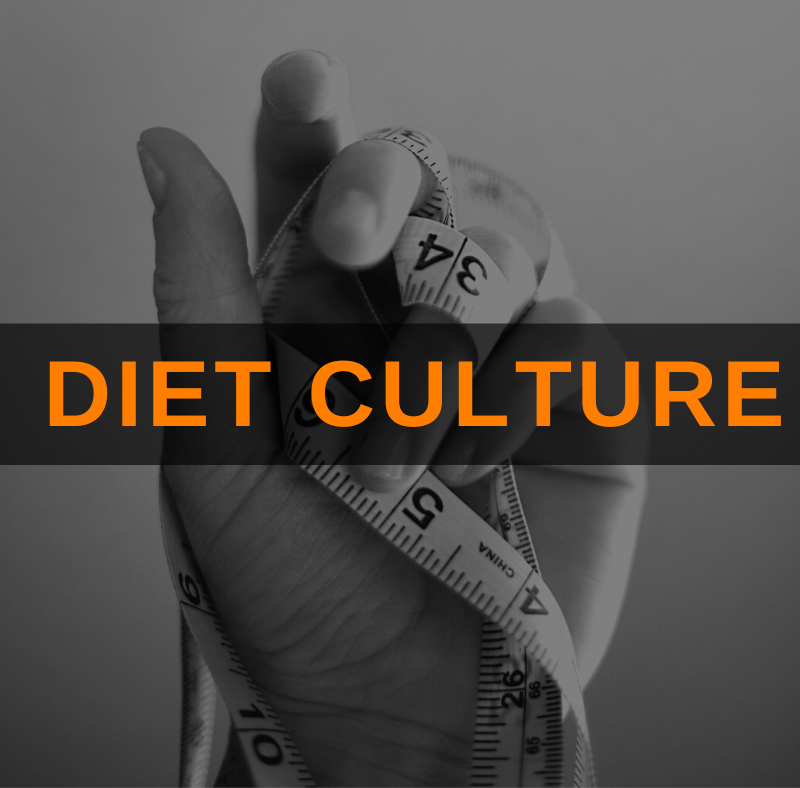
Discussions on race, rights, the election, the COVID-19 pandemic, and unemployment aren’t the only headlines sweeping social media feeds globally this year. Loud are the voices of women who are fed up with a culture in which if we live in a body that’s larger than the societal norm our goal should be to become smaller. In recent years the term ‘diet culture’ has gained popularity among body-positive bloggers, celebrities, and mental health professionals. While it may seem that those fighting against diet culture are fighting against personal trainers, dietitians, and other health professionals, it’s important to recognize that the way we market and run our personal training business can either solve or perpetuate the issues that diet culture causes.
What is Diet Culture?
Eating Disorder Registered Dietitians and Professionals (EDRD PRO) defines diet culture as, “a belief system that focuses on and values weight, shape, and size over well-being.” Though focusing on weight, shape, and size aren’t innately wrong, valuing those things over total physical, mental, social, spiritual, emotional, intellectual, or financial wellness is. The consequence of valuing any single area of wellness over all others is that we get thrown out of the balance that brings true and long-lasting health.
Behaviors and results of diet culture can include, but are not limited to:
- Labeling foods or food groups as “good” or “bad”
- Avoiding, or eliminating entire foods groups or specific foods in a food group (i.e. carbohydrates or fat)
- Completely avoiding foods that are high in carbohydrates, fat, or calories
- Feeling anxiety about making the wrong decision on what to eat
- Feeling guilt after eating
- Ignoring biological cues for hunger, fullness, and satisfaction.
- Believing that you have to use supplements or powders to be healthy
- Avoiding social situations or environments because of the type of food being served
- Fixating on appearance, including compliments on weight loss, gain, or body size
- Believing that you are superior to others because you eat a certain way
- Believing that you are inferior to others because you don’t eat a certain way
- Believing that you are unworthy because of your weight, body size, or shape
- Believing that you are worthy because of your weight, body size, or shape
- Allowing body size, weight, or shape to determine happiness
- Using exercise as a punishment or compensation rather than for joy
- Feeling the need to justify your reason for eating
- Being praised or praising others for their “good” eating habits
- Constantly talking about food, weight, exercise, etc.
If you read that list and thought “that sounds a lot like the health and wellness industry today” you wouldn’t be entirely wrong. In fact, you may even be thinking, “I’m a health and wellness professional, and yet I recognize some of those behaviors in my own life. Does that mean there’s something wrong with me?” For instance, you may avoid sugar altogether because you believe it to be a toxic element of nutrition, not because you think it will make you “fat”.
That’s the problem with diet culture, it’s often hard to separate healthy behaviors from diet-centric behaviors. According to EDRD PRO, diet culture is a 40 billion dollar industry that spends a lot of money on marketing to make you feel all of those things on the list above and more.
Who is to Blame for Diet Culture?
In the last year, anti-diet-culture messaging has swept social media and some of these messages aim to erase personal trainers, dietitians, health coaches, etc. from the equation as part of the solution. But does that mean we are to blame? Brace yourself…
The answer is “yes” and “no.” Diet-culture is just that. It’s a culture with insecurity and body dissatisfaction at its very cornerstone. Diet-culture is perpetuated by those looking to make money off of those feelings of insecurity and dissatisfaction.
If personal trainers and other health professionals aim to grow their client list by marketing themselves as the solution to their insecurities, feeling of inadequacy, or feelings of being unworthy, then they are certainly part of the problem. If personal trainers and other health professionals aim to grow their client list by marketing themselves as a tool to promote well-being, longevity, and function, then they are certainly not part of the problem.
Be Clear
Men and women alike are becoming fed up with the message that if you don’t fit the societal ideals, you are “less than.” Unfortunately for us, the public, this is where many social media influencers, marketers, and ads companies make their money.
When marketing personal training services, it’s important to be clear and inclusive in your messaging. Great personal trainers aim to make a lifelong impact on the health and well-being of their clients, not just fix their temporary insecurities or self-dissatisfaction. We aim to change lives for the long term.
- When Marketing Your Services – Avoid using language that insinuates that the audience feels dissatisfied with their body shape, size, or weight. Instead, use language that expresses the experience you aim to give clients when they train with you.
- When Onboarding a New Client – Notice if their goals are solely focused on appearance, body shape, or body size and help them to set goals that focus on function, ability, and progress.
- When Training Your Clients – Avoid fixating on weight, size, or body shape and be sure to check in with your client on how they feel, how they are functioning, and how they are progressing toward their goals.
- When Talking to Yourself – Avoid holding all of your value in how you look, how much you weigh, or what shape you are, and take time to affirm yourself for your skills, your abilities, and your accomplishments.
Although there is a lot of money to be made from diet-culture, it’s robbing our clients of becoming truly healthy and well individuals. Take time to audit your marketing messages and identify whether you are promoting diet-culture or promoting inclusive, life-long wellness.







